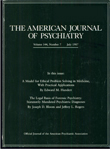Posttraumatic Stress Disorder and Functioning and Quality of Life Outcomes in a Nationally Representative Sample of Male Vietnam Veterans
Abstract
OBJECTIVE: Although posttraumatic stress disorder (PTSD) is a highly prevalent and often chronic condition, the relationship between PTSD and functioning and quality of life remains incompletely understood. METHOD: The authors undertook an archival analysis of data from the National Vietnam Veterans Readjustment Study. The study subjects consisted of the nationally representative sample of male Vietnam veterans who participated in the National Vietnam Veterans Readjustment Study. The authors estimated PTSD at the time of the interview with the Mississippi Scale for Combat-Related Posttraumatic Stress Disorder. They examined the following outcomes: diminished well-being, physical limitations, bed day in the past 2 weeks, compromised physical health status, currently not working, and perpetration of violence. Logistic models were used to determine the association between PTSD and outcome; adjustment was made for demographic characteristics and comorbid psychiatric and other medical conditions. RESULTS: The risks of poorer outcome were significantly higher in subjects with PTSD than in subjects without PTSD in five of the six domains. For the outcome domains of physical limitations, not working, compromised physical health, and diminished well-being, these significantly higher risks persisted even in the most conservative logistic models that removed the shared effects of comorbid psychiatric and other medical disorders. CONCLUSIONS: The suffering associated with combat related-PTSD extends beyond the signs and symptoms of the disorder to broader areas of functional and social morbidity. The significantly higher risk of impaired functioning and diminished quality of life uniquely attributable to PTSD suggests that PTSD may well be the core problem in this group of difficult to treat and multiply afflicted patients. (Am J Psychiatry 1997; 154:1690–1695)



